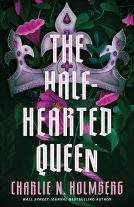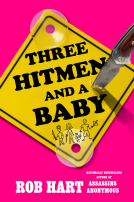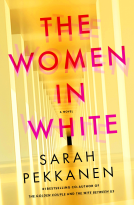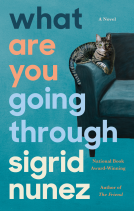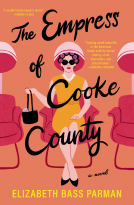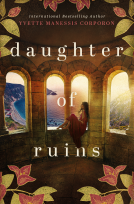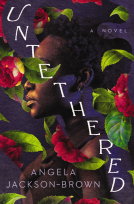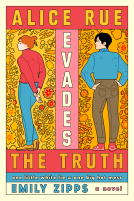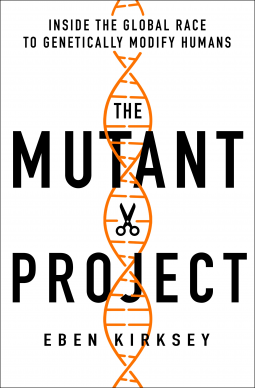
The Mutant Project
Inside the Global Race to Genetically Modify Humans
by Eben Kirksey
This title was previously available on NetGalley and is now archived.
Send NetGalley books directly to your Kindle or Kindle app
1
To read on a Kindle or Kindle app, please add kindle@netgalley.com as an approved email address to receive files in your Amazon account. Click here for step-by-step instructions.
2
Also find your Kindle email address within your Amazon account, and enter it here.
Pub Date Nov 10 2020 | Archive Date Nov 13 2020
Talking about this book? Use #TheMutantProject #NetGalley. More hashtag tips!
Description
An anthropologist visits the frontiers of genetics, medicine, and technology to ask: Whose values are guiding gene editing experiments? And what does this new era of scientific inquiry mean for the future of the human species?
"That rare kind of scholarship that is also a page-turner."
—Britt Wray, author of Rise of the Necrofauna
At a conference in Hong Kong in November 2018, Dr. He Jiankui announced that he had created the first genetically modified babies—twin girls named Lulu and Nana—sending shockwaves around the world. A year later, a Chinese court sentenced Dr. He to three years in prison for "illegal medical practice."
As scientists elsewhere start to catch up with China’s vast genetic research program, gene editing is fueling an innovation economy that threatens to widen racial and economic inequality. Fundamental questions about science, health, and social justice are at stake: Who gets access to gene editing technologies? As countries loosen regulations around the globe, from the U.S. to Indonesia, can we shape research agendas to promote an ethical and fair society?
Eben Kirksey takes us on a groundbreaking journey to meet the key scientists, lobbyists, and entrepreneurs who are bringing cutting-edge genetic engineering tools like CRISPR to your local clinic. He also ventures beyond the scientific echo chamber, talking to disabled scholars, doctors, hackers, chronically-ill patients, and activists who have alternative visions of a genetically modified future for humanity.
The Mutant Project empowers us to ask the right questions, uncover the truth, and navigate this brave new world.
Note: The publication date of this title has changed. The new publication date is 11/10/2020.
Available Editions
| EDITION | Other Format |
| ISBN | 9781250265357 |
| PRICE | $28.99 (USD) |
| PAGES | 304 |
Average rating from 27 members
Featured Reviews
Gene editing on humans is certainly a controversial topic; Eben Kirksey makes a pretty sold case on the opportunities and pitfalls of CRISPR/CAS9 applications based on current examples of which some crossed some current ethical boundaries. Over the course of the book, the stories illustrate the great service these technologies can provide to human health, but also the risks involved. It becomes clear that gene editing is perhaps not as reliable of a technology one may thing, and errors in modifying crops have probably vastly less consequences than errors in mammals or even human beings.
Mutations in our genome happen all the time, but what ethics shall lead us to decide where we leave mutation to random natural events or targets artificial treatments. The book asks the question, but does not really postulate a stance on this balance. While I find the stories throughout the book truly engrossing, I was a little disappointed with the ending. Still, 4 Stars for me.
I would rate this ⭐4/5⭐
I learned a lot from this book and it deepened my understanding and knowledge, about things I only briefly understood prior to reading.
Looking into all of the different perspectives and situations in regards to gene editing and their pros and cons, was quite eye-opening to say the least. I didn't know the full extent of the story about Jiankui He, and unfairly considered him a "mad scientist" in the rush to modify humans. Getting a different perspective and sourced information was truly enlightening and informative.
CRISPR/Cas9 (and related gene editing tools) are giant leaps in science and the future, but they raise many ethical questions. A lot is discussed and covered in this book, which helped me form an opinion and understand further, with wonderfully sourced material. I won't include my personal stance as it's not important, but the author does an incredible job of staying neutral and just delivering the facts, which is ideal in my reading. There is no true clear answer to this being right or wrong, but we get to read a lot of personal stories and gain insight into why some fear it and others favor it.
I will say that some things were not necessary filler, to a book of this subject, like the details about what people had for lunch. Also the author sharing personal information about his fertility results for the purpose of science and understanding, was quite admirable, but I found it highly unnecessary to include the details of the pornographic content they offered in the clinic. It was out of place and off-putting to me.
That said, I did enjoy this and I have a new take on the subject matter, which is always nice to take away from a book. The author broadened my understanding, my empathy for those that find gene editing necessary and also furthered my hesitance to accept it as the future.
This was well organized, well thought-out and held my interest. I would absolutely recommend this.
We are all aware of mutants. And they exist not just in pop culture or scifi novels but also in the real world. And they aren't as glamorous as the superheroes from comic books but they exist all the same.
A few decades ago science gave us the first testtube baby during a time when the idea was unconceivable (excuse my pun). Today IVF and fertility clinics exist all around the world. In 2012, scientists learned how to modify DNA with CRISPR and in 2018 the world's first genetically 'edited' babies were born. This revolutionary experiment to modify the genetic code of humans so that they are born HIV resistant, took place in China. But other trials and experiments have been taking place in USA before that.
Eben Kirkskey takes us on a journey on how the revolution came to be. From the labs of Shenzhen to the lobbies of Washington DC to the streets of Yogyakarta, this book is about the trials and tribulations of the activists, the participants, the scientists, the dreamers and the cynics. There is a moral question as to where gene editing is the right way to solve problems. And of course there is no right or wrong answer to this question. The process is unpredictable and hence dangerous. It is aslo expensive and hence inaccessible for the marginalized population. Then comes the question of the right use of this technology. In the wrong hands it will be possible to edit out unwanted characteristics in a human, and there will come a time when there won't be any place for people of colour or differently abled people because everything can be changed or 'enhanced'. Do we truly want that? One the other hand this can be the solution to critical diseases. Either way, this is still a topic of debate for the scientific community.
This book will make you think. And it will help you learn so much. At times it did feel a bit long, but I loved how it read more like a work of fiction. Highly recommended!
Thank you Netgalley and St. Martin's Press for the e-ARC.
"CRISPR has no power. This molecule only becomes powerful in the hands of individual people."
The Mutant Project: Inside the Global Race to Genetically Modify Humans was a surprisingly fluid read. Eben Kirksey takes a famous, intricate, ethically-controversial topic and examines it through scientific, anthropological, and modern lenses. He highlights how science can be obstructed with controversy and that nothing in the field, now merging into that of eugenics, is as black-and-white as it seems.
The book also provides insight into the financial/business/global aspects of genetic modification, in which private companies essentially market their services with "repeat customers" in mind. For example, the book highlights how men with lower fertility rate who depend on IVF can precipitate their future children/grandchildren/etc. to have fertility problems as well, thus forcing them to return to clinics for fertility treatment. Another instance is Kirksey's parallels of how gene editing will affect third-world countries, especially in regards to culture and traditions.
Overall, Kirksey details the science in an easily understandable way, engaging readers across all audiences, not just the science/medical community. The future is today, and this book is a great introduction into the world of gene editing. I would recommend this book to everyone interested in expanding their worldviews or collection of knowledge at large.
The Mutant Project bring readers into the real work of genetic research and the questions that need to be asked before we try and even more detail gene editing in the world. What would a perfect human be? Well it before everyone who only the wealthy nations to choose who is deserving of the research and science.
As a teen many of have read the book Brave New World and if that book taught us anything at all is that no matter the "protection of information" it will never be as peaceful or perfect as people will hope for.
The author looks at all sides of the debate the pros and cons as well as the many different political, financial, religious aspects of gene editing.
The author is able to bring readers to find their own decision though the research that has been done.
This book is for science nerds to stay at home moms because some day this will effect everyone.
Thank you to Netgalley and the publisher for the advance copy of Eben Kirksey The Mutant Project
 Pat P, Reviewer
Pat P, Reviewer
The Mutant Project is a well written book that goes into great detail about the conference held in China. Many scientists, some world renowned, attended and claims were made of how human DNA could be modified to make a perfect human who could be resistant to disease, have stronger bone structure and have a longer life. Laboratories are already doing substantial testing and hoping someday to create perfect human beings.
I found the book to be both fascinating, but also very disturbing, especially how our DNA is obtained for the scientists. It is very controversial of course and almost sounds like something out of a science fiction novel. It will raise many questions - how far should we go to eliminate disease, but in doing so, are we playing with nature and the future human babies.
I thank the author, publishers and Netgalley for my ARC in exchange for my honest review.
 Educator 23289
Educator 23289
Kirksey provides a very unique perspective on the opportunities and challenges of gene editing technologies by focusing not merely on the science but also on the potential inequalities, challenges to access, and ethical issues.
The frame for most of the book is set by the recent announcement of HIV-resistant, gene-edited babies born in China. As the book progresses, the discussion centers more on HIV/AIDS. In both scenarios, Kirksey is able to weave in science, politics, business and social equity as key discussion points. The discussion on whether the hoopla around Chinese scientists is more motivated by politics and competition was an interesting one.
The book, however, could have been more compact - the discussions and observations tend to repeat and there is no clear narrative arc - there is no central hypothesis or set of premises that the author wants the reader to explore.. Therefore, while informative at times, the book doesnt inspire.
 kATHLEEN G, Reviewer
kATHLEEN G, Reviewer
This is one to pick up if you are interested in the emerging issue of gene modification. Kirksey has done his best to bring technical details down to earth for non-scientists, in part by focusing on the people who have been working in the field. Jianki He, a Chinese scientist, set off global concerns in 2018 when he not only used CRISPR to alter the DNA of human embryos and then told the world about it. This touches on some of the ethical issues but, to be fair, it's not meant to full discussion of that aspect of the research. Kirksey wraps his own medical issues into the book which sort of works. Thanks to Netgalley for the ARC. Intriguing and informative.
I love all types of books about genes, genetic testing, gene editing, etc. and I think the non-fiction books about the subject are even more interesting than the fiction ones. I love questioning my own ethics when I read and changing my mind about what I think is acceptable and what is not--the line is thin and ever-changing.
In addition to learning all the new ways genetic modifications can be applied, I am also interested in who gets to make the rules surrounding the science and how to hold scientists accountable. How do you make scientists from a variety of countries adhere to the same rules, especially when different countries hold different social, religious, and ethical beliefs? For example, "secular Chinese medial ethics draws on Confucian thought, which assumes that a person becomes a person after it is born, not before. Intellectuals in China do not generally share the preoccupations of Western or Christian bioethicists who think that human life is sacred from the moment of conception." This core belief allows for Chinese scientists to move forward in areas where the United States pulls back, allowing them to take the lead in the field. Will lawmakers have to take all religions and moral beliefs into account to make laws which the entire scientific community must follow?
Author Eben Kirksey touches on so many ideas, obstacles, and possibilities within this science and includes a wide variety of viewpoints. I recommend this book to anyone who loved The Immortal Life of Henrietta Lacks, who is interested in diseases and medical inequality, or to anyone simply looking to educate themselves on the science occurring right now that could affect human evolution.
 Abby S, Reviewer
Abby S, Reviewer
Gene editing on humans is a controversial and at the same time fascinating topic.The author is an excellent guide to this topic.I learned a lot about a topic I did not know a lot about,The discussions arguments there’s a lot to process and think about,Highly recommend for anyone who like probing scientific debate,#netgalley
This is a fascinating deep dive into the world of CRISPR genetics, designer babies and the ethical questions surrounding them. I really enjoyed the science, stories and the focus on potential social effects of gene editing. The books straightforward approach allows the reader to engage with the stories while becoming more informed on the world of biotech.
I also posted this review on Instagram @hmmclean
 Elle D, Reviewer
Elle D, Reviewer
Eben Kirksey explores advances in and questions the principles which inform our interaction with genetic engineering in The Mutant Project. This book zeroes in on one of the most recently discovered genetic engineering technologies, CRISPR, which garnered a great deal of attention after it was revealed that twins had resulted from a pair of embryos that had been genetically modified using this technology. Kirksey provides context by surveying the history of genetic engineering and ditches scientific jargon to provide clear descriptions of the technology used without oversimplification. We are introduced to real people, with very palpable needs, desires and intentions - some good and others somewhat questionable. Kirksey explores the history of DNA and genetic engineering research in detail in this book and the way in which people have interacted with these advancements over the years. Biotechnology companies facilitate ground-breaking research and develop life-changing, and often life-saving, gene therapies but often sell them at such exorbitant prices that these treatments remain inaccessible for the majority of people who stand to benefit from them. Grinders believe that gene engineering tools should be available to the public and engage in (sometimes risky) genetic modification of their bodies within their community. Researchers are constantly encouraged to push the envelope while the lives of several in dire need of novel or existing gene therapies hang in the balance. Kirksey interrogates our relationship with genetic engineering, discussing limits, capabilities and accessibility of current and future technology. This account is thought-provoking, extremely informative and overall a well written book.
 Kyra D, Reviewer
Kyra D, Reviewer
This book was a bit slow moving at first but I loved the information about CRISPR and I loved the concluding chapter of the book. If you’re interested in learning more about this cutting edge technology with a focus on how the first CRISPR babies came to be then this is the perfect book to learn more.
 Diane H, Reviewer
Diane H, Reviewer
With the first genetically modified babies born in October 2018 in China, The Mutant Project has officially begun. Of course, the doctor involved was ultimately sentenced to a three-year prison term. But once the genie is out of his bottle, it’s impossible to coax him back in.
It turns out that CRISPR, the tool used for gene editing, is less like Microsoft’s cut and paste and “more like a tiny Reaper drone that can produce targeted damage to DNA.” It can “produce serious collateral damage, like a drone attack that accidentally takes out a wedding party instead of the intended target.“
The book spends a lot of time (42%!) explaining how the AIDS crisis has produced a bunch of genetic hackers trying to use loops of DNA to fight AIDS. Injecting yourself with untested “cures” reminds me of citizen science during the Renaissance. It is both exciting and scary in equal measures.
Much of the history depicted here is also shown in the Netflix limited series, Unnatural Selection, in edited form. So if you were intrigued by the show, you can get more details here. Or you, like me, can watch the show after reading the book to see what everyone looks like.
If you like real science written in an easily understandable way, read The Mutant Project. It does a great job explaining how gene manipulation may soon cure genetic diseases. CRISPR, more disturbingly, can also allow rich parents to pick their child’s physical traits and health risks, well before birth. It really is a Brave New World. 4 stars!
Thanks to St. Martin’s Press and NetGalley for a copy in exchange for my honest review.
 Susan M, Reviewer
Susan M, Reviewer
An astonishing book about doing gene modification on human embryos. It’s not just for diseases any more. When the author went to a conference, she found out that a Dr. He from China had produced two healthy baby girls with the ability to resist the HIV virus. Dr. He first lost his job at an university, then a China district court put him into prison for his genetic babies that he was responsible for. The doctor has announced his work by using YouTube videos. Dr. He did not want to announce this at the conference until a journal published his work. It wasn’t like scientists world-wide hadn’t been experimenting but not on humans. At this time, it isn’t done though in the near future it may. If so, it will be for the rich as it is very expensive to do. I don’t think I want some of this gene surgery done as the implications are more than I could decide what is right or wrong to do in regard to gene surgery. Would there be superior humans vs. normal humans? How would that effect the life of humans?
Remember the tv show “X-files”? Reading this nonfiction book, “I want to believe” that they would wisely use a set of ethics that all would follow, but would they? Humans are very competitive when bribed or should I say encourage by their country’s government. It is a fascinating look at a science I don’t think about as a rule. I think reading this book has changed that for me. The author has written an engaging book. It’s written to show us what the future could hold for us or will?
 Reviewer 329115
Reviewer 329115
"The coronavirus pandemic was making it clear that humanity needed robust public health services, not exorbitantly priced genetic medicine" (Kindle location 4042).
Yes! Absolutely true! But … how?
This is an interesting popular science book about the advances in gene editing and the ripples it is sending outward from the world of medicine into other corners of human activity. The main story is about Chinese scientist Jiankui He, who was first hailed, and then reviled and jailed, for his (successful) attempts to modify human embryos, but there are interesting detours into crip culture, the history of AIDS research and treatment, and inequalities in access to US health care.
Chapter 7 (“Will I Have to Mortgage My House?”) was especially interesting to me because I have a (so far) non-deadly form of leukemia and the chapter chronicled the (very expensive) treatment by gene manipulation of children who had a more deadly form of same. In addition to the enormous cost, the treatment and recovery process was quite scary, so you won't find me dashing out to gene-edit myself, even though I also found out in this book that certain foolhardy (in my view) people are doing just that. (Apparently, you don't need any special permit to gene-edit yourself.)
I am – mid-pandemic – looking for reasons to be cheerful and I allowed myself to find one in Chapter 7, thinking that today's expensive and scary treatment could be the future's more affordable and merely uncomfortable treatment for those who fail to respond to other, more traditional, less science-fiction-y methods. Also, if I understand correctly, gene editing – if improved from its current state – could give rise to “one-and-done”-style treatments, releasing those with certain chronic diseases from the periodic nerve-wracking visits to the hospital and waits to see if the results of the most recent blood draw will carry bad news and need for further treatment.
As noted at the top, this book also contains a heartfelt appeal to redirect medical brainpower and resources away from attention-grabbing treatments that will be accessible only to the most well-off, and toward the rest of us. This book quotes a University of California professor: “… CRISPR technologies inside capitalist and individualist medicine that distracts healers (and investment) from the medicine we need …” (location 4037).
I seem to read a lot of books these days on different topics that implore us to look toward the long-run common good, but hardly any of them talk about how to accomplish this laudable end. This book is no exception. At the end, I wanted to shake the book and yell, “Tell me how to make it better!”
I received a free electronic advance review copy of this book from St. Martin's Press via Netgalley. Thanks for the generosity.
 Ryan M, Reviewer
Ryan M, Reviewer
This was a fascinating look at gene editing, focused mostly on the CRISPR took and following the 2018 story about the first genetically modified babies born in China. I knew the basics going in about the backlash from the China births and have seen headlines about how powerful CRISPR can be. This book provided a look back at the history of genetic modifications using CRISPR and other tools.
I found this book to be very interesting, bouncing between CRISPR details, discussions with leading scientists via interviews or at conferences, and Dr. He's plans to use CRISPR to modify embryos to make the babies resistant to HIV and AIDS. This book read like a written documentary--not taking a stand either way (until the epilogue) but delivering the facts and background to allow the reader to make their own decision. Very interesting read.
 Maria Grazia B, Book Trade Professional
Maria Grazia B, Book Trade Professional
Despite the winking title, this is not a science fiction book. However, for many people what it is about is somewhat science fiction. It is in fact a long account inside, outside and along the borders of 'gene editing', a procedure that is already being used today, sometimes successfully and sometimes not, to treat rare genetic diseases. By telling the story of the first two girls who were genetically modified at conception to inactivate the HIV receptor, the author takes the opportunity to talk about access to treatment, the gap between rich and poor, eugenics, profit and much more.
If this were the title of a fiction book, you might expect the main characters to be brilliant but misguided scientists, funded by biotech start-ups who see potential for massive profits by developing methods to manipulate human DNA. The applications of such technology for the treatment of genetic diseases, cancers, and viral infections could be worth billions of dollars.
At the same time, some of the more entrepreneurial see the potential for selectively breeding certain traits that humans find desirable and profitable-high IQ, increased muscle mass, designer skin color, and enhanced fertility, including choosing the gender of babies.
You would be right except The Mutant Project is not fiction; it is based on facts, meticulously researched by Eben Kirksey, Ph.D. In this book, Dr. Kirksey chronicles his travels around the world as he learned about genetic modification using CRISPER and interviewing multiple scientists and investors who were involved in the first genetically edited babies born in 2018.
CRISPER, “clustered interspaced short palindromic repeats” was discovered in bacteria in 1987, its purpose initially unknown. By 2012 scientists Jennifer Doudna and Emmanuelle Charpentier demonstrated how to modify human DNA with CRISPER. It is an enzyme that can “generate mutants by chopping up DNA.”
Even though Dr. Kirksey is writing as a journalist, he makes it clear that he agrees with those who feel this technology must be approached cautiously, as there is a clear risk that “biotech companies may put profits ahead of patients.”
The chief protagonist of this saga is Dr. Jiankui He of China, the physician scientist responsible for modifying two embryos, creating the first edited babies in the world, twin girls born in China in October 2018. How Dr. He went from “powerful scientific entrepreneur to pariah” within a few short years is both riveting and disappointing.
This story moves at a rapid pace as the author travelled around the world interviewing multiple people in varied locations; I suggest not laying the book aside once you start. A background in basic biology is helpful but not necessary to enjoy this book, since the ethical and moral issues it raises go beyond the realm of science. One does not need a graduate degree in genetics to understand this book, although I am sure it would help.
One of the nicest features of the book-it is dedicated to the twin girls, Lulu and Nana, who live in China with their parents and are reported to be healthy.
Readers who liked this book also liked:
Yvette Manessis Corporon
General Fiction (Adult), Historical Fiction, Women's Fiction
Marie Bostwick
Historical Fiction, Literary Fiction, Women's Fiction

